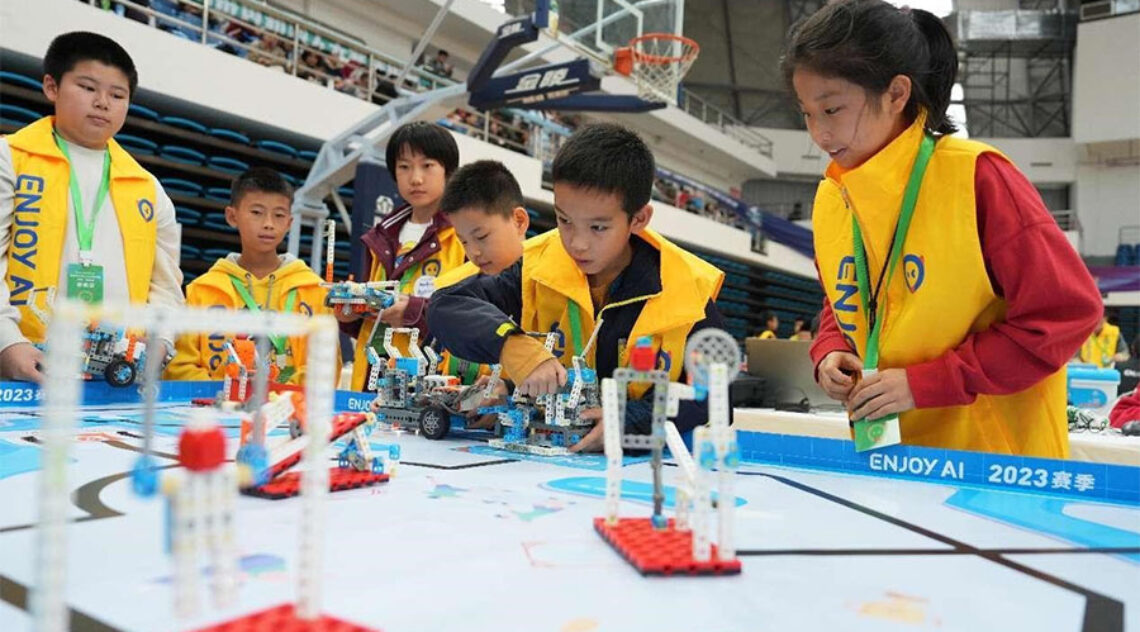
Artificial intelligence (AI) education is gaining momentum in China. China’s Ministry of Education (MOE) recently announced a list of 184 primary and secondary schools selected as AI education bases, with the aim of better promoting the development of AI education.
Six schools in Beijing were on the list, including Beijing Hongzhi Middle School.
“Since 2018, we have been gradually exploring the application of AI technology in our classrooms,” said Cai Lei, principal of Beijing Hongzhi Middle School. Currently, students are benefiting from the fruits of AI applications in many subjects, Cai added.
In English classes, students can use AI products to enhance their speaking skills. Whenever a word is mispronounced, it will be immediately displayed on a screen.
After Chinese language classes, teachers will utilize a large language model developed by the Research Center for Language Intelligence of China to grade students’ compositions, improving their writing skills in an efficient manner.
During physical education classes, AI equipment can automatically record data on each student’ performance, such as the number of pull-ups and standing long jump distances. The data is then carefully analyzed to offer tailored guidance to enhance their physical capabilities.
Beijing Hongzhi Middle School has also introduced general education curriculums on information technology and established a dedicated club to support students with a keen interest in this subject and help them develop their skills. During the winter break this year, the school launched an AI course specifically for middle school students.
“I believe the development of AI technology should allow intelligent machines to assist human life, and even expand human intelligence. I’m sure that this technology has a bright development prospect,” said Li Muqi, a sophomore student who joined the course.
“The acquisition of knowledge about AI technology is essential for the growth of primary and secondary school students in multiple areas,” Cai noted.
Offering AI-related courses in primary and secondary schools not only prepares students for the changing world, but also develops their cognitive processes and bolsters their scientific proficiency, laying a foundation for them to better face competition and challenges in the era of intelligence, he said.
AI is not only changing the way students learn, but also transforming teaching methods.
Wei Yungang, director of the experimental education center at Beijing Normal University’s School of Artificial Intelligence, told People’s Daily that currently, the main role of AI technology in education is to help with lesson planning and teaching organization.
“For instance, with help of computer vision and other AI technologies, teachers can gain better insights into students’ learning status, knowledge comprehension and emotional state. This provides new ways for teachers to accurately assess the situation of each student and develop personalized teaching plans to meet their needs,” Wei said.
Additionally, AI offers more possibilities for instructional design and teaching implementation.
“AI technology can make up for limitations of traditional classrooms and assist teachers in creating more novel and engaging curriculum. For instance, big data analysis can help identify the most effective teaching methods and materials; generative AI can be used for knowledge search and classroom scenario simulations; augmented reality technology can make classroom presentations more engaging and effective,” Wei explained.
Today, Chinese universities are strengthening the development of AI disciplines. As of 2023, 498 universities in the country had offered undergraduate programs in AI.
Many Chinese universities are collaborating with major tech companies to provide joint training programs for AI talents, so as to adapt to the rapid iteration of AI technology, the high demand for AI professionals, and the extensive applications of AI.
Wuhan University recently announced to establish a robotics department within its School of Computer Science together with tech firm Xiaomi. Focusing on core AI technologies, the robotics department aims to build a collaborative innovation system integrating enterprises, universities, research institutions, and end-users.
Huazhong University of Science and Technology has partnered with tech giant Baidu to establish an innovation center for AI education, which will combine teaching scenarios with industrial needs to conduct cutting-edge education and scientific research, thereby supplying the industry with innovative talents in large model applications and development.
“AI is a discipline involving computer science, mathematics, statistics, cognitive science, and other related areas. When cultivating AI talents at institutions of higher education, we should place a strong emphasis on building a solid foundation of knowledge while also strengthening school-enterprise cooperation and the collaboration among enterprises, universities, and research institutions, thus allowing students to grow through practical experience,” said Wei.